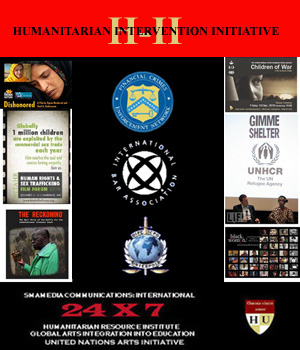Related UN Contingency Discussions:
-----------------------------------------------------------------------
22 April 2011 - Updated 17 July 2013
From: Stephen M. Apatow
Founder, Director of Research & Development
Humanitarian Resource Institute
Humanitarian University Consortium Graduate Studies
Center for Medicine, Veterinary Medicine & Law
Phone: 203-668-0282
Email: s.m.apatow@humanitarian.net
Internet: www.humanitarian.net
International
Disaster Information Network
Internet:
www.humanitarian.net/idin

To: FINCEN - Interpol - IBA: HRI-ICC Council
Subject: Jurisdiction Critical for Prosecution of Financial
Crimes - FINCEN - Interpol - IBA: HRI-ICC
Current discussions on the bar association and attorney level in 192
countries are to support legal analysis and prosecution of
interconnected financial market crimes, within each countries
jurisdiction.
In the context of the geosystemic economic discussion, it is critical
to define the size and scope of market distortions associated with
financial crimes, so we can establish a special mechanism to address
the resultant damage, accommodate restructure, and debt relief.
This focus is
critical as we painfully watch a failed central bank zero interest rate
strategy, spiral the global financial system into a deeper crisis.
Failure
is attributed to one variable, investment banks access to central
bank emergency lending facilities, the current funding source for
speculative
trading in the stock and commodities markets, the oil shock, food
crisis
and global humanitarian emergency.
Today, economic survival in UN member countries is dependent on access
to low interest rate central bank emergency funds. Once the rates
increase, the financial crisis in the vast majority of countries
spirals into a deeper economic crisis state or the next level of
insolvency. As we watch the oil shock and food crisis
destabilize entire continental regions, it is now impossible to use
conventional market mechanisms or an increase in interest rates, to
address the cause of hyperinflation. This scenario duplicates the
events that followed the flood of liquidity by central banks following
the market crash of 1929, when hyperinflation and damage was only
stopped by the Banking Act of 1933 [1] or Glass-Steagall (that shut
down investment bank access to the central bank window). Our
current crisis began with the repeal of Glass-Steagall in 1999 (that
held the system together for 70 years), with the collapse of the global
financial system in
2008. Following the crash, appeals for immediate restoration of the
Glass-Steagall regulatory protections were ignored. Instead, a zero
interest rate central bank emergency policy allowed emergency central
bank funds to flow directly into investment banks and speculative
trading (the cause of the crisis), again
through the unregulated OTC derivatives market and shadow banking
system.
The substance of this strategy, has left the global
financial system
one shock away from a full blown crisis, according to World Bank
President, Robert Zoellick. [2]
In the U.S., the interrelationship of financial crimes to the
municipal, state and federal budget crisis is a critical aspect of
emergency economic contingency discussions, substantive efforts for
resolution and sustainable stabilization. The concept of austerity and
taxation during a non-declared state of economic emergency, hinge on
the edge of insanity. Since it is impossible to contain a crisis
caused by an unregulated $1.2 Quadrillion ($1,200 Trillion) [3] OTC
derivatives based shadow banking system, with
a conventional economics interest rate based strategy, perhaps it is
time
we get a grasp on the true size and scope of the problem at hand and
establish a strategic plan to resolve it.
In a globalized world, we need all the players, in every interconnected
UN country on board, this is why the discussion was opened to the UN
Human Rights Commission, Security Council level. [4]
Looking forward to feedback and guidance for UN member countries.
References:
1. The Glass-Steagall Act a.k.a. The Banking Act of 1933: Archive.org.
Url: www.archive.org/details/FullTextTheGlass-steagallActA.k.a.TheBankingActOf1933
2. World Bank president: 'One shock away from
crisis' , 17 April 2011. Url: www.bbc.co.uk/news/business-13108166
3. Remarks by Jill Considine: At the joint European Central
Bank/Federal Reserve Bank of Chicago Conference on “Issues Related to
Central Counterparty Clearing” Frankfurt,
Germany, April 4, 2006. Url: www.ecb.int/events/pdf/conferences/ccp/Considine.pdf
3. Financial Crimes Referred to UN Commission on Human Rights -
Security Council: HRI:UNArts Humanitarian Intervention Initiative, 13
April 2011. Url: www.unarts.org/H-II/ref/4132011OHCHR.html
|